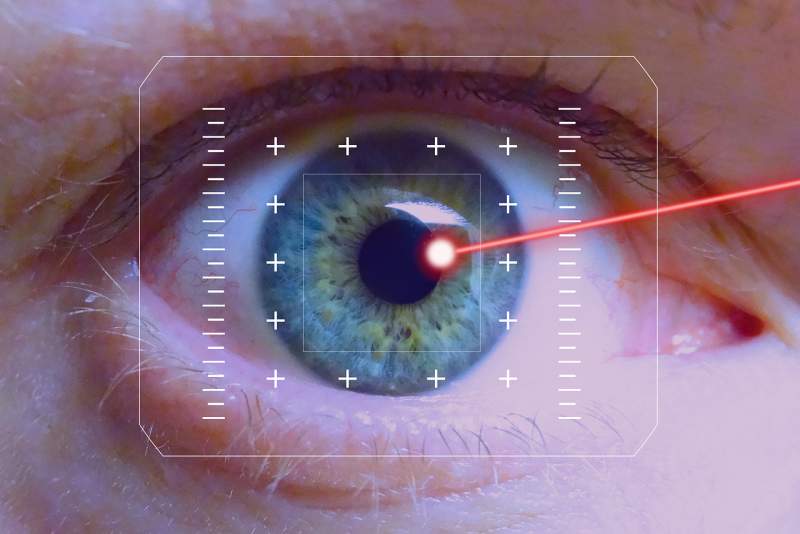People have laser eye surgery for a variety of reasons. Some have an active lifestyle, and want freedom from glasses so they can swim, play sport and climb mountains. Others don’t see themselves as glasses wearers, and do all they can to avoid wearing them, even at the expense of their eyesight. Contact lenses come with their own difficulties, whether it’s the cost of disposable ones or the maintenance of rigid ones. Laser eye surgery can free you from glasses and contact lenses – it’s easy to see why so many people have chosen the LASIK procedure.

Everyday life
Anyone who wears glasses is all too aware of their limitations. Whether you struggle in dimly-lit restaurants, can’t spot a friend in a crowd or simply can’t see clearly when you open your eyes in the morning, your life could be changed by laser eye surgery. Instead of sitting through dinner with your reading glasses glamorously perched on your head or having your friends take you by surprise, you could have your eyesight corrected, through safe, up-to-date laser eye surgery techniques.
Lifestyle choices
If you play sport, you’ll be familiar with the problem of glasses slipping down your sweaty nose, or changing into contact lenses when you change into your trainers. Swimmers have an even harder time, as swimming in glasses is impractical and swimming in contacts poses a risk of serious infection.
Packing for a holiday isn’t easy either, with spare glasses, contact lens solution or even disposable lenses on the list. Sleeping on a long-haul flight is miserable for anyone, but sleeping in contact lenses only makes it worse. If you’re always on a rugby pitch or in a swimming pool, or if you’re a frequent traveller, laser eye surgery is well worth considering.
Self-esteem
Some of us just don’t like glasses. If you’ve ever lied to your family about what the optician said, “lost” your glasses or “forgotten” to bring them with you, you’re probably someone who eventually saved up for contact lenses or is still struggling with no vision correction at all. If you should wear glasses and don’t, laser eye surgery could help you become the person you always knew you were.
People who have had laser eye surgery can’t recommend it highly enough. The joy of being able to see clearly for every waking moment can’t be underestimated. The experience that non-glasses wearers take for granted is available to everyone, through laser eye surgery.
I thought laser eye surgery was really expensive!
One of the biggest perceived barriers to laser eye surgery is the cost. In fact, the cost of laser eye surgery is probably less than you think, particularly when you compare it with the cost of glasses or contact lenses over your lifetime. Laser eye surgery costs, on average, £1,700 per eye. That may sound like a lot as a one-off price, but it’s actually the same as twenty years’ worth of glasses or ten years’ worth of disposable contact lenses. The difference is, laser eye surgery will last you the rest of your life.
It is also worth remembering that many laser eye clinics offer finance options so you can spread the cost.
Does it hurt?
No. You will be given anaesthetic eye drops before laser eye surgery, and drops to take away with you to protect you from infection and keep your eyes moist and comfortable.
Will I have to take time off work?
While you can go back to work the day after surgery, it is best to take it easy. We advise taking at least a couple of days off work following the procedure.
You will be able to see immediately after the procedure, although your vision may be misty at first. Most people can see clearly 24 hours after laser eye surgery.
What happens during the procedure?
The most common laser eye surgery procedure is LASIK. It is so successful and has such a low complication rate that wherever possible it is offered to people seeking laser eye surgery. It is the most commonly-performed elective surgical procedure worldwide.
LASIK stands for Laser-Assisted In-Situ Keratomileusis. It is a straightforward procedure that usually takes about ten minutes. After introducing anaesthetic eye drops, the surgeon uses a laser to fashion a small, circular flap in the outer cornea. This flap is folded away to reveal the bed of the cornea. Then a computer-guided laser removes a pre-set amount of tissue and corrects the shape of your cornea. Lastly, the flap is replaced, healing with the help of the eye’s natural processes.
What are the risks?
Complications occur in fewer than 5% of LASIK cases, and it’s always a good idea to ask the surgeon you choose about his or her success rate. A good laser eye surgeon can keep risk to a minimum by combining the latest methods with solid experience.
Some people experience dry eyes after laser eye surgery. This can be minimized by keeping up with the eye drop regime proposed by your surgeon, and most cases resolve within six months.
Haloes, glare and starbursts are among the problems a few people experience with their night vision after laser eye surgery. These issues usually self-correct within six weeks.
Laser eye surgery changes lives for the better, making everything easier from playing sport to going on holiday. In addition, it is a relatively quick and painless procedure. The cost compares favourably with glasses and contact lenses and the risk of complication is very low.
Find out more by contacting our clinic – and free yourself from the burden of glasses and contact lenses!
